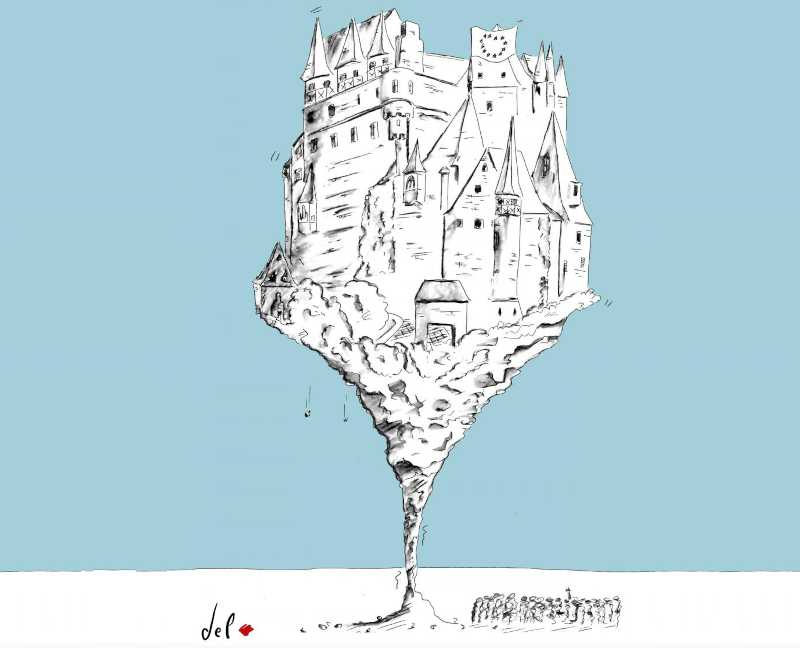
Hans Kundnani is an associate fellow in the Europe programme at the Royal Institute of International Affairs (Chatham House) in London and a visiting fellow at The Remarque Institute of New York University. He’s the author of Utopia or Auschwitz. Germany’s 1968 Generation and the Holocaust, The Paradox of German Power and Eurowhiteness. Culture, Empire and Race in the European Project.
Green European Journal: In your book Eurowhiteness, you discuss Europe’s civilisational turn. What do you mean by that? When did it begin, and when did it become apparent?
Hans Kundnani: It is not entirely clear when it began. It may not even be apparent now, at least to a lot of people. I started thinking about the civilisational turn around 2020 and 2021. But in retrospect, the critical juncture was the refugee crisis in 2015. In the two decades between the end of the Cold War and 2010, the EU had been in expansive, offensive mode. It was optimistic and outward-looking, and imagined a world that could almost be remade in its own image.
The phrase that captures this best is the title of a book by Mark Leonard of the European Council on Foreign Relations, Why Europe Will Run the 21st Century. This hubristic, optimistic period came to an end with the eurozone crisis, the Arab Spring in 2011, and then the Russian annexation of Crimea in 2014. Europe begins to see itself as being on the defensive.
So the change is already there in the first half of the 2010s, but then with the refugee crisis in 2015, this defensiveness takes on a different shape. Not only does the EU see itself as being surrounded by threats but, after 2015, it also perceives these threats in civilisational terms.
That’s the civilisational turn, when threats are no longer seen in an ideological way or in a geopolitical or realist way, but in the context of a Huntingtonian “clash of civilisations” (where conflicts happen between civilisational blocs united by culture), as threats against a European civilisation that must be protected.
Your book argues that what underlies this turn is “Eurowhiteness”. What is Eurowhiteness and where does the term come from?
I borrow this term from József Böröcz, a sociologist. He uses the phrase in a very particular way to discuss the internal hierarchy within what he calls the “structure of whiteness”. He differentiates, roughly, Western Europeans from Central and Eastern Europeans and Southern Europeans, who have an aspirational desire to become fully white. I use it in a slightly different way.
For me, Eurowhiteness is an ethnic/cultural idea of Europe. My argument is that there are both ethnic/cultural and civic currents of ideas of Europe going back to the Enlightenment at least. In particular, I talk about Eurowhiteness to suggest that Europe and whiteness have something to do with each other, which is sort of obvious when you think about it, though it’s not something people want to talk about. The idea of a post-war European identity, centred on the EU, is one that a lot of pro-Europeans want to believe has nothing to do with whiteness. But I argue that the ethnic/cultural version of European identity persisted after World War II, and influenced and informed European integration itself.
In which of today’s EU policies do you see the civilisational turn?
It’s mostly visible in migration policy. Since 2015, Europe has in effect been building a wall in the Mediterranean. In other words, it’s not that different from the policy that Trump pursued while he was US president, except that, instead of a land border with Mexico, it’s a sea border with North Africa. Human Rights Watch says that EU migration policy can be summarised in three words: “Let them die”. Since 2014, [almost 30,000 people have died or have gone missing] in the Mediterranean. More than [3000] in 2023. The Mediterranean is the deadliest border in the world.
The ethnic/cultural version of European identity persisted after World War II, and influenced and informed European integration itself
Since Ursula von der Leyen became European Commission president in 2019, there’s been a European Commissioner for “promoting our European way of life”. It was originally for “protecting our European way of life”. There was a stupid argument in the European Parliament about that verb, but the real problem is not the verb, but the phrase “our European way of life”. The job of the Commissioner for Promoting our European Way of Life is, at least in part, to keep migrants out. It makes it very explicit that migration is not just a difficult policy problem to manage but a threat to the European way of life.
This language of civilisation is also creeping into European foreign policy. The far-right tends to bang on about the threat to European civilisation from migration, but the centre right increasingly uses the same language to discuss European foreign policy. In all the debates about European sovereignty, strategic autonomy, and a geopolitical Europe, there’s this real sense that Europe needs to defend itself from threats perceived in civilisational terms. [...] My fear is that the far-right and the centrists are increasingly thinking in the same way.
Discussions of race inevitably lead back to colonialism. In the immediate decades after World War II, the founding members of the EU were all white European empires who banded together as they were losing their colonies. Why is the post-imperial part of the EU’s origin story often forgotten?
There is an empathetic answer and a more cynical one. Let me start with the cynical answer. The EU has mythologised itself partly as a conscious strategy of what I call “region-building”, which is analogous to nation-building in the 19th century. The myth tends to be a comforting, positive story about your history that ignores some of the realities. After the colonial histories of France or the Netherlands had come to an end, they consigned it to a “memory hole”, as historian Tony Judt puts it. They kind of moved on and tried to forget a painful, difficult history of humiliation. Colonialism was something that they just wanted to move on from.
But I have a slightly different and less cynical interpretation of why it gets forgotten. From the 1960s onwards, the Holocaust started to become a central collective memory within the EU and for pro-Europeans. Tony Judt writes that Holocaust recognition is “our contemporary European entry ticket”. The disconnect between the memory of the Holocaust and the forgetting of colonialism is striking, and I would argue that there’s a structural dimension to that disconnect.
The Holocaust and the Second World War fit very neatly into the existing narrative of the EU as a peace project. This is a story that pro-Europeans tell about what the EU has done, from the Schuman plan to overcoming the centuries of conflict between France and Germany that culminated in World War II. What that story does is to encourage Europeans to think about their histories almost exclusively in relation to each other. It is the history of Europe as an internal story of how European countries interacted with each other in which the rest of the world is completely forgotten. The external lessons of European history, what Europeans did to the rest of the world, but also conversely the influence that the rest of the world had on Europe, in particular Africa and the Middle East, are erased.
Thinking about European history as a closed system brings Europeans together. It allows them to think of themselves as a “community of fate”. But when you start to bring in the history of European colonialism, it has almost the opposite effect. It starts to pull Europeans apart. For example, France has to think about its history in Algeria, West and Central Africa, and Indochina [today’s Cambodia, Laos, and Vietnam]. If you start to think of your history as being part of a different community of fate, that of your former colonies, you have a responsibility to them. [...] Engaging with the history of colonialism encourages Europeans to think in terms of alternative communities of fate.
Do you think that the response to the full-scale Russian invasion of Ukraine has also been responded to in civilisational terms?
I think it is fairly clear that the war has been framed in quite a civilisational way. The contrast between how Ukrainian refugees and refugees from other parts of the world are treated is very striking. At the beginning of the war, von der Leyen said, “Ukraine belongs to us”. That language would never be used about Algeria, Morocco, or Syria. I also think that Russia is being constructed as a civilisational “other” against which Europe defines itself, and there’s a long history to that idea.
There are other ways to look at the war though: in a realist way or even an ideological, neoconservative way – that is, as part of a global struggle between democracy and authoritarianism.
Is it possible to separate supporting, say, European sovereignty from exclusionary discourses? Can you not support European strategic autonomy and maybe even a European army without slipping into defending racist border policies?
There are at least two alternative ways of thinking about a geopolitical Europe, and there may be others too. The first is very realist. In a world of great power competition, Europe also needs to be a continental great power alongside China, the United States, Russia, and so on. It might be hard for pro-Europeans to think in that way because it requires them to abandon the high moral ground, the pro-European moral superiority as it were. But there is nothing wrong with that realist framing.
There is also an ideological framing free of ethnic, religious, or civilisational connotations. This is an argument about the global struggle between authoritarianism and democracy, which hawkish people in the UK and US think about. I don’t agree with that reading, but at least the civilisational element is absent. A powerful Europe with a coherent, effective European foreign policy doesn’t have to be a great civilisation.
👉 Full article on Green European Journal
Do you like our work?
Help multilingual European journalism to thrive, without ads or paywalls. Your one-off or regular support will keep our newsroom independent. Thank you!












